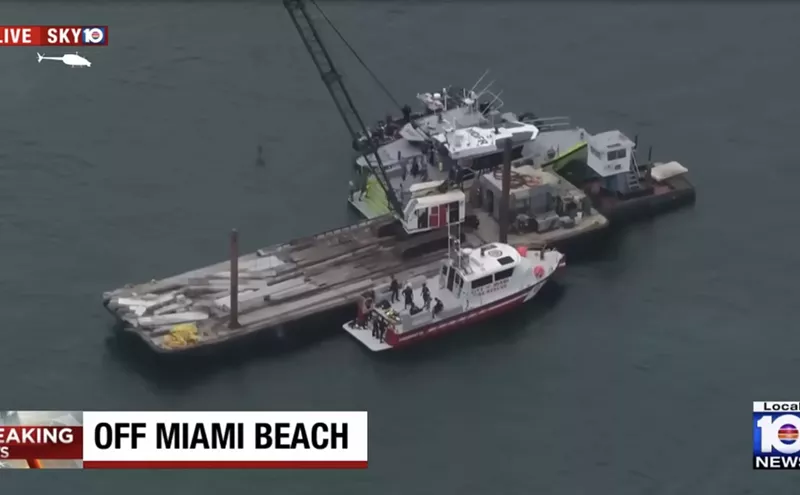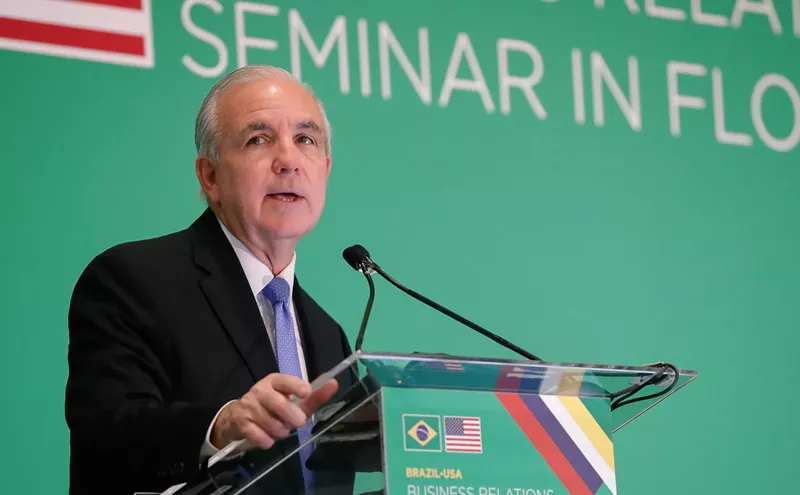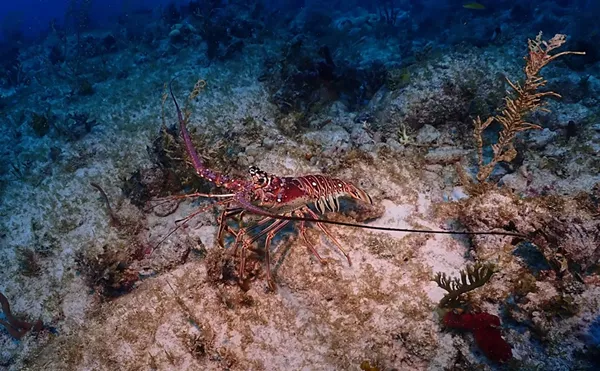Last March 31, Miami native Christopher Korge hosted more than 160 guests at his sprawling $2.6-million, seven-bedroom lakeside mansion in Pinecrest. They had paid $4,600 each to hear Korge's neighbor, music mogul Timbaland, MC the event. By the end of the evening, the lawyer-turned-real-estate-developer had raked in at least $736,000 for the presidential campaign of another of that night's guests: Hillary Clinton, the favorite in this Tuesday's primary election in Florida.
Raising bundles of cash for pols is nothing new for Korge, who parlayed a local lobbying practice into lucrative business ventures at Miami International Airport during the late Nineties. He garnered enough for Bill Clinton's presidential campaigns to earn an overnight stay in the White House's Lincoln Bedroom. And in the last two presidential elections, he bundled more than $7 million for Al Gore and John Kerry, according to the New York Times.
"[Chris is a] smart, assertive guy who knows what he wants and doesn't take no for an answer," says Joe Garcia, chairman of the Miami-Dade Democratic Party. "And being friends with the President of the United States is nothing to shake a stick at."
But Korge, who declined to comment on the record for this story, has a long history of controversy. Though never charged with a crime, he has been at the center of four questionable deals at Miami International Airport that have cost taxpayers millions of dollars. One of them spawned a criminal investigation.
The 52-year-old La Salle High School alum started in politics with the help of his father, who served decades as campaign treasurer for late Democratic Rep. Dante Fascell. At age 15, Korge spent the summer in the nation's capital as a congressional page. In a 1998 New Times cover story, he said of the experience: "From that point on, I knew that I wanted to be a lawyer. I fell in love with the legislative process."
After graduating from Temple University law school, he joined the Miami Beach City Attorney's Office in 1981. Four years later, he took a similar job with the City of Miami. In 1988, he left public employ to join the law firm Holland & Knight, and soon established a working relationship with Rodney Barreto, an ex-Miami Police officer who had started his own successful lobbying practice.
Soon Korge and Barreto found their political prince in Alex Penelas, whom the pair helped win a seat on the county commission in 1990. From that moment on, especially during Penelas's eight-year run as Miami-Dade's executive mayor, virtually everyone with designs on a county contract hired one or both of them to gain access to the halls of power. To ice his role, Korge began fundraising. In the past two decades, he has collected millions of dollars for county politicians, including at least two who were forced from office owing to scandal: Miriam Alonso and Pedro Reboredo.
Along the way, Korge amassed a multimillion-dollar fortune, much of it from lobbying fees paid by county vendors, including heavyweights like AT&T and Parsons Brinckerhoff Construction Services. "He certainly was a big player at one point in time," says executive director of the Miami-Dade ethics commission, Robert Meyers. "The perception is out there that you have to hire a lobbyist to get access to county officials."
Some of Korge's deals that raised questions at county hall include:
• In 1992, he was the lobbyist for Sirgany International, which was vying for a contract to run airport newsstands. Korge business associate Sergio Pino, a Cuban-American, was a minority partner in Sirgany's proposal. Though the joint venture was ranked second and third in two impartial evaluations, the county commission chose it for a 10-year contract. A 2002 Miami-Dade Office of the Inspector General (OIG) report concluded that minority involvement in the deal was "neither real, meaningful, nor legitimate."
• The next year, Dade Aviation Consultants, a consortium of engineering firms overseeing Miami International Airport's maligned and oft-delayed $6.2-billion expansion, paid Korge, Barreto, and a third lobbyist each $16,000 a month. A 2002 investigation by the OIG claimed the trio received $1.3 million over nine years whether they worked or not. The OIG report terms the county relationship with Dade Aviation "unhealthy for the long term."
• Though a county study in 1994 showed airport passengers would spend millions more if gift shops offered better merchandise, two years later Korge persuaded airport officials to block opening a Disney retail store that would compete with Sirgany's gift shops.
But perhaps most controversial was the airport's $40-million food and beverage concessions contract, which county commissioners in 1998 awarded to Host Marriott Services Corp. and a minority joint venture known as World Wide Concessions, which were represented by Korge and Barreto, respectively.
Four years later a federal grand jury began to probe allegations the deal was rigged to circumvent minority participation rules. County and federal public corruption investigators discovered both Host Marriott and the minority firm had privately agreed to give Korge and Barreto 10 percent of their profits, according to grand jury information reported by the Miami Herald and New Times in 2004. In addition, World Wide Concessions received $33,225 per month to do virtually nothing.
The investigation came to an abrupt halt when then-Miami-Dade Police Director Carlos Alvarez clashed with Marcos Jimenez, then-U.S. Attorney for the Southern District of Florida. Jimenez accused the police department's detectives of leaking information about the sensitive investigation, which Alvarez denied. The police director then yanked his underlings from the case. Alvarez, who is now county mayor, said he believed Jimenez was afraid or unwilling to bring criminal charges against some of the most powerful political players in Miami-Dade.
No one was ever charged with a crime, and the case was closed in the summer of 2006, says Korge's former law partner and criminal defense attorney Steven Chaykin, who contends his friend (and client in this case) was a victim of politics and jealousy. "The more success you have, the more people can take shots at you to take you down a few notches," Chaykin says. "The airport investigation bothered him a great deal."
After all, in 2000 — two years after the Host Marriott deal was inked — Korge quit the lobbying business and became national finance chairman for Al Gore's campaign. Since then, he has worked hard to refashion his image into that of a successful businessman who's simply interested in the direction of the Democratic Party.
And it has generally worked. On March 12, 2006, New York Times Magazine reporter Matt Bai wrote, "If you harbor serious thoughts of running for the presidency, the first thing you do — long before you commission any polls or make any ads, years before you charter planes to take you back and forth between Iowa and New Hampshire — is to sit down with guys like Chris Korge. A real-estate developer in Coral Gables ... Korge is one of the Democratic Party's most proficient 'bundlers.'"
Yet Korge critics remain. One of them is his first cousin and a former Miami Beach mayor, Alex Daoud. "He's a phony," Daoud hisses. "The guy is an absolute fraud. I would love to see him face-to-face in the street or in the ring."
The 65-year-old ex-pol served as a Miami Beach commissioner and mayor from 1979 to 1991. Just days before his final term ended, the feds indicted him on 41 counts of bribery, obstruction of justice, and tax evasion. Two years later, a jury found Daoud guilty on one count of bribery; he later pleaded guilty to four counts of obstruction of justice and tax evasion. He served 18 months in federal prison.
This past December, Daoud and a partner self-published a memoir, Sins of South Beach, which details how as a city commissioner he circumvented nepotism rules by maneuvering the Miami Beach City Attorney's Office into hiring Korge. "When he was unemployed and needed a job, I helped him," Daoud writes. "When I went to trial, I never gave up his name and I did everything to protect him."
Shortly after Daoud's release from prison 11 years ago, he visited Korge at his law practice, Daoud says. "I was persona non grata," he grouses. "He didn't want to know me. He kept asking me if the feds were looking at him."
The two still don't get along. "We can have a charity boxing match," Daoud says. "Maybe we can give the money to Hillary."
And she just might take it. Clinton has accepted — then returned — donations from California businessman and Pakistani immigrant Abdul Rehman Jinnah, who fled the country last March after prosecutors accused him of steering more than $50,000 in illegal donations to a political action committee associated with Clinton. Then there was the $825,000 she was forced to return that was raised by convicted felon Norman Hsu. Clinton's campaign office ignored four requests for comment about Korge.
Chaykin explains, "Chris has had a lot of success because he is an extremely persuasive fellow. In all the years I have known him, I have never seen him do anything that would adversely affect my opinion of him."












